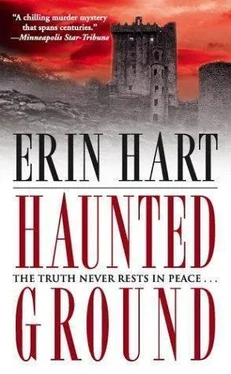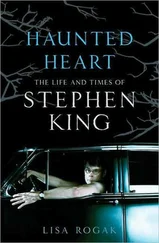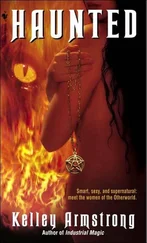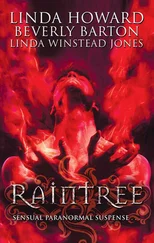“A machicolation. Something the original owners would’ve installed for dropping stones or boiling water on unwanted visitors. We don’t actually use it anymore, as you can see.” Nora studied Osborne’s benign expression. Getting rid of a body was no simple task—two bodies must be much more difficult. How had he done it? And how had he gotten away with it this long?
“You’re in time for supper,” he said, “but perhaps you’d like to see where you’ll be staying first.” She followed him up the huge main staircase, noting his silent, measured footsteps on the Oriental carpeting beneath their feet. Upstairs, he led her halfway down the central corridor. He pushed open a door and stepped aside, gesturing for Nora to enter. A heavy four-poster bed dominated the room, which was darkly paneled and even more darkly furnished. The windows were draped in a heavy wine-colored brocade. The effect was impressive, if rather gloomy.
“I apologize if the room is a bit musty. It’s been a long time since we had visitors.”
“I’m sure I’ll be fine,” she said.
“Good. Supper’s in the kitchen—below the hall where you came in; just go through the door under the main staircase.”
Nora heard a knock as she lifted her small case onto the bed. Cormac stuck his head through the open door.
“Thought I heard voices, but I wasn’t sure. My room’s all the way down at the other end of the corridor. Anyway, welcome.”
“Thanks again for letting me come along. Cormac, I’m sorry about last night….”
Even from across the room, she could feel his warm eyes envelop her. “Don’t worry about it. I was out of line. See you below?”
“Wait, I have something to show you—can you come in for a second? You might want to shut the door.” She reached into her briefcase and pulled out a file as he joined her beside the bed. “Have a look at those.” Cormac sat on the bed to scan the first few photographs, the documentary shots from the conservation lab.
“Keep going.” He flipped through the prints until he came to several grainy, indistinct images, video stills from the endoscopic exam.
“That’s it,” Nora said. “The piece of metal in the girl’s mouth that showed up on the X rays. You still can’t see what it is. But we’ve got to wait for official approval from the museum before trying to remove it.”
“Any more about the cause of death?”
“Well, Drummond concurred that there’s no evidence of blunt trauma to the head. There’s also no evidence of strangulation. I told him my idea about execution, and he agrees that it’s one possibility, especially given that flap of skin missing from her chin. But he says the remains are too old and too fragile for the definitive tests that would say whether decapitation occurred pre-or post-mortem.”
“I suppose it’s as much as we can expect,” Cormac said, still studying the video image. “May I keep these?”
“Of course.” She hoped her next question wouldn’t sound too pointed. “You’ve met Hugh Osborne a couple of times now, Cormac. What’s your impression?”
“I’ve hardly seen him since I arrived. I wouldn’t say he’s overly friendly, but that’s understandable. We’re only here to do a job for him.”
“Did he say anything about what happened out at the bog?”
“No. The longest conversation we had was about his family, all those portraits on the stairs. Evidently his branch of the family came to Ireland with Cromwell.”
A person couldn’t have Irish connections and avoid hearing about Oliver Cromwell’s legacy: the dispossession and transplantation of Catholic landowners, the half million who died and the thousands more who were transported or sold into slavery in the colonies.
“He said the man in the painting at the bottom of the stairs, Hugo Osborne, got this house and lands from an Irishman named O’Flaherty.”
“I’m amazed that he’d go into all that.”
“It is more than three hundred and fifty years ago, Nora. I don’t think Osborne can be unacquainted with his family’s reputation, any more than he’s ignorant of what people are saying behind his own back now.”
Nora spent the entire meal studying Hugh Osborne. He’d put together a fine curry for supper, and while she watched the two men eat heartily, Nora found she wasn’t the least bit hungry. She was picking at the remains of her dinner when the outside door opened, and a boy about seventeen years of age stumbled into the kitchen. His dark hair was severely cropped, and his dirty sweater, several sizes too large, hung on his slender frame. After a brief silence Osborne said, “I’m glad you’re back.” The boy looked down at the floor and tried to brush past them, but tripped and staggered directly into Nora; his right hand struck her wineglass, which tipped over the edge of the table and smashed to pieces on the flagstone floor. She tried to catch him, but he fell heavily against her, his face pressing into her chest. He seemed to think this was terribly funny, and let out a half-strangled chuckle, filling her nostrils with his volatile whiskey breath.
“Are you all right?” she asked, taking the boy by the shoulders and setting him upright. He swayed, but remained standing.
“Jeremy,” Hugh said, “please be careful of the glass there.” The boy stood in front of Nora for a moment longer, his dark, glassy eyes staring as though he could barely see her through a haze. Despite being thin and dirty, not to mention flushed and red-eyed from drink at the moment, he was extremely beautiful, in an almost feminine way, with long eyelashes, and flawless porcelain skin.
“Don’t mind me,” the boy said thickly. “Carry on.” He turned and made a shaky retreat out the door that led upstairs.
“I’m terribly, terribly sorry,” Osborne said to her. “Are you all right?”
“I’m fine. Please, it was nothing, an accident. But maybe we should get rid of this broken glass before anybody steps on it.” Nora stooped to gather up the larger pieces, and as Hugh Osborne went into the hall to fetch a broom, she whispered to Cormac: “Devaney never said—”
Hugh Osborne evidently overheard her. “Jeremy doesn’t belong to me. He’s Lucy’s son.” A slight upward movement of Cormac’s eyebrows indicated his surprise, and Nora wondered what the mother must be like. While Osborne finished sweeping up the glass, she began to clear away the table.
“Jeremy and his mother live here with you?” she asked.
“Yes,” said Osborne. “They came here from England eight years ago, after Jeremy’s father died. Daniel was a distant cousin; we only met at university. But I never had much in the way of family, so I rather enjoyed having a cousin.”
“What happened to him?” Nora asked. Hugh Osborne looked at her cautiously, as if he’d spoken to strangers once too often and regretted it, but he continued.
“A suicide. He apparently made some rather questionable investments, and lost everything. I gather there was a possibility of criminal prosecution as well. I suppose he couldn’t face it. He, ah—” Here Osborne paused, as if he’d momentarily lost his train of thought. “He shot himself. Jeremy was the one who found him.”
“God help him,” Cormac murmured.
“Everything they had—including Lucy’s family home—had to be sold to pay off the debt. She and Jeremy had nowhere else to go, so I offered them a place here. It was her own idea to take up the housekeeping; it’s not something I would have asked. And I must say she’s been a rock—” Here Osborne stopped, as if suddenly aware that his guests were devoting their full attention to him.
“I’m sorry,” he said. “I shouldn’t burden you with family troubles.” With deliberate care, he placed the last piece of crockery in the sink. “I’ll show you the priory plans now, shall I?”
Читать дальше











